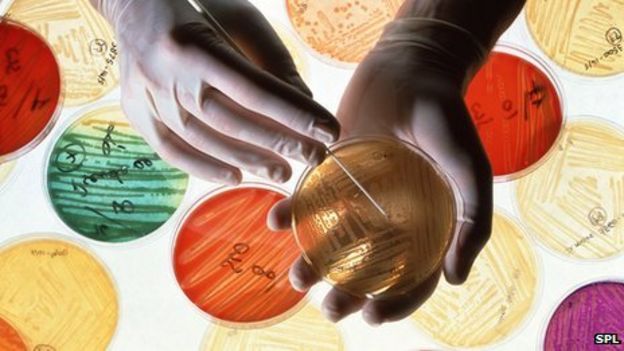- 19 November 2015
- Health
-
(건강) 항생제 내성아름다운 인생/건강 2015. 11. 21. 01:10
출처: http://www.bbc.com/news/health-21739378
Q&A: Antibiotic resistance 항생제 내성
 SPL
SPLThe race is on to find new antibiotics to treat resistant infections Why do antibiotics stop working? 항생제가 말을 안 듣는 이유
Antibiotics are designed to kill or block the growth of bacteria, but not all bacteria are susceptible. Some are naturally immune. Resistance also arises spontaneously by chance mutations. Resilient strains can then multiply and thrive - overnight, one bacterium can multiply to become a million. 항생제는 박테리아의 성장을 막거나 박테리아를 죽이는 약이나, 모든 박테리아가 항생제에 취약하지 않다. 내성이 우연한 돌연변이로 생긴다. 회복력있는 종들은 밤새 증식할 수 있고 번창할 수 있다. 하나의 박테리아는 일백만의 박테리아로 증식할 수 있다.
When the antibiotic of choice is given it kills the sensitive bacteria but any resistant ones live on. Resistance can also be passed from one species of bacterium to another.
Is overuse of antibiotics to blame? 항생제의 과다 복용은 안 좋은 행위
The more an antibiotic is used, the greater the chance there will be that bacteria will develop resistance to it. Experts are concerned that antibiotics are being used inappropriately. 항생제를 많이 쓸 수록, 박테리아가 항생제에 대한 내성을 기를 수 있는 가능성이 높아진다.
Many are prescribed and used for mild infections when they don't need to be. Antibiotics cannot help you recover from infections caused by viruses, such as common colds or flu, for example.
Another issue is people who fail to take the whole course of prescribed antibiotic. Stopping treatment early means that the under-treated bacteria could turn resistant.
It is thought that the widespread use of antibiotics in animals has led to resistant strains of some bacteria being transmitted to humans through food.
Is it getting worse?
Experts are concerned that we are reaching a point where some previously manageable infections will become untreatable with antibiotics.
The superbug MRSA is now resistant to so many drugs that it is already hard to treat.
Recently, there have been reported cases of the sexually transmitted disease gonorrhoea that have been resistant to all the antibiotics normally used to manage the infection.
We are seeing cases of multi-drug resistant TB and the emergence of threatening new resistant bacteria like New Delhi metallo-beta-lactamase (NDM-1).
Resistance has now been found to the drugs used when all else has failed - such as colistin - leading some scientists to warn we are on the cusp of a "post-antibiotic era".
Resistant bacteria are spread through direct contact with a person or animal with that infection in the same way that other bacteria spread. Resistance is a particular problem in hospitals and places like old people's homes where many vulnerable people are gathered together.
Increased international travel means people infected with resistant bacteria in one country can spread them to another country very quickly.
Why don't we have enough new antibiotics? 새로운 항생제가 충분히 많이 없는 이유
Pharmaceutical companies are placing renewed emphasis on the search for new antibiotics and are also developing new vaccines to prevent common infections. 제약회사들은 새로운 항생제를 찾겠다고 공언도 하고 일반적 감염을 예방하는 새로운 백신들을 개발하고 있다.
But these ventures are expensive to fund and in terms of cost-effectiveness for the company, may be less attractive than other business opportunities. 그러나 이런 사업들은 제약회사 입장에서 가격대비 효과를 따지면 고비용이라, 다른 사업 기회들보다 덜 매력적이다.
A course of antibiotic treatment is typically quite short - days or weeks - and doctors are advised to be frugal with their prescribing to help avoid resistance developing.
If major resistance does occur, the drug would be a write-off for the pharmaceutical company that developed it.
Many of the "newer" antibiotics are chemical variants of older agents and this means resistance development can occur quickly.
What can I do to help?
If you are prescribed antibiotics by your doctor, make sure you complete the course even if you feel better because not taking the full course encourages the emergence of resistance.
Remember that antibiotics are important medicines and should only be taken when prescribed by a health professional. They do not work for viral infections, only bacterial ones.
Don't share your antibiotics with anyone else.
Basic hygiene - hand washing and taking care when preparing food - can stop the spread of many bacteria, including some resistant strains.
** 기사요약 **
1. 항생제는 남용하지 말자.
2. 항생제는 의사가 처방해준 양만 복용한다. 그 이상도 그 이하도 안 된다.
3. 항생제 개발은 제약회사 입장에서 고비용이다. 그래서 새로운 항생제가 충분히생 많지 않은 것이다.
4. 항생제는 박테리아 관련 약이라 바이러스 감염에는 무효하다는 사실을 잊지 말자.
'아름다운 인생 > 건강' 카테고리의 다른 글
(건강) 돌연변이 모기 항(抗)말라리아 (0) 2015.11.26 (건강) 기초대사량 및 하루 필요 열량 계산법 (0) 2015.11.25 (건강) 기생충은 여성의 수태능력을 향상시킨다 (0) 2015.11.21 (건강) 수면 모드가 필요한 스마트폰 (0) 2015.11.18 (건강) 색깔 바뀌는 밴드는 항생제 내성문제 해결사 (0) 2015.11.18